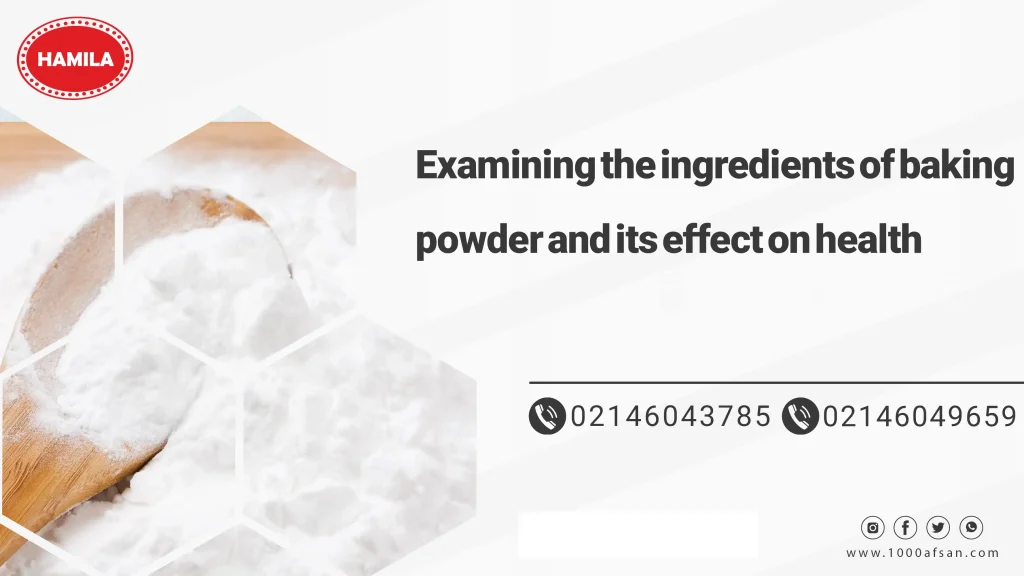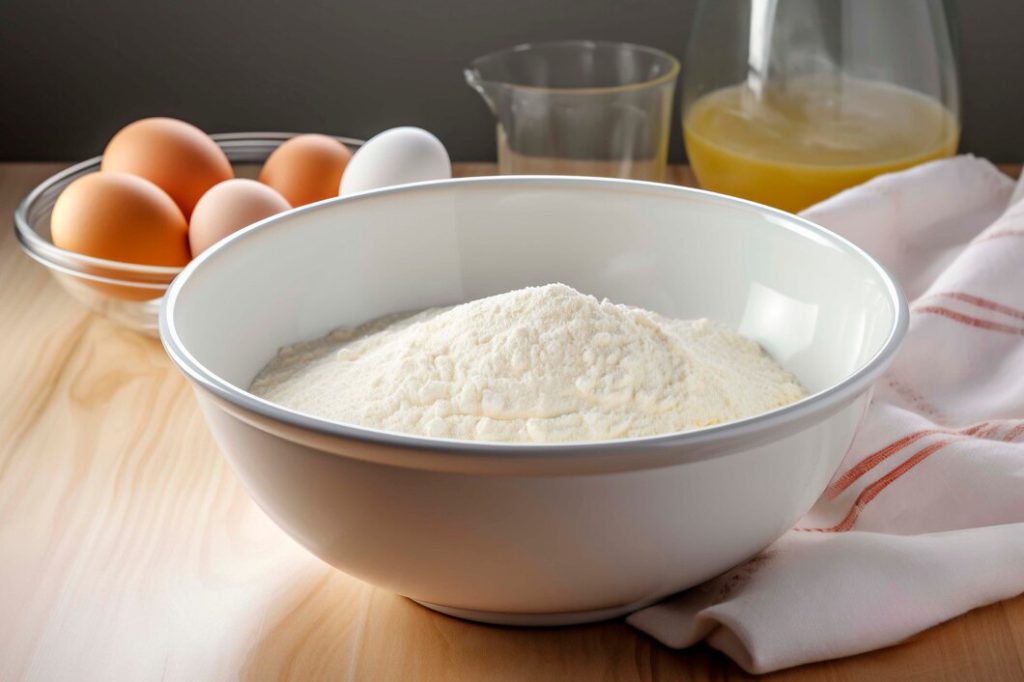Examining the ingredients of baking powder and its effect on health

Baking powder is one of the main ingredients in cooking, which is used to increase the volume and improve the texture of bakery and confectionery products. This material consists of various chemical compounds, each of which plays a specific role in the cooking process. In this article, we will take a closer look at the ingredients of baking powder and their possible effects on health.

Baking powder ingredients
Baking powder is a dry white powder that is used in cooking to create a light and fluffy texture in baked products such as cakes, bread and cookies. The main ingredients of baking powder are:
1. Sodium bicarbonate (baking soda)
Sodium bicarbonate with the chemical formula NaHCO₃ is one of the main components of baking powder. This alkaline compound reacts with acids to produce carbon dioxide (CO₂). The CO₂ gas resulting from this reaction helps the dough of bakery and confectionery products to form small bubbles that lead to an increase in volume and puffiness. Additionally, sodium bicarbonate acts as a neutralizing agent in recipes that contain acidic ingredients, reducing off-flavors.
2. Cream of tartar (potassium bitartrate)
Cream of tartar with the chemical formula KC₄H₅O₆ is a dry and stable organic acid that is commonly used in baking powder. This substance reacts with sodium bicarbonate to produce CO₂ gas, which helps the dough to rise. Cream of tartar helps to maintain the quality of baking powder for a long time due to its stability and dry properties. Also, this substance can be used to stabilize egg whites and prevent crystallization of sugar in syrups.
3. Sodium aluminum sulfate
Sodium aluminum sulfate, with the chemical formula NaAl(SO₄)₂, is another acid used in baking powder. This compound reacts at high temperature and helps produce CO₂ gas during the cooking process. This feature is especially useful in recipes that require longer cooking, as the CO₂ gas is gradually released and helps to increase the volume of the dough. Another advantage of this material is to maintain freshness and prevent premature wear of baking powder.
4. Sodium acid pyrophosphate
Sodium acid pyrophosphate (Na₂H₂P₂O₇) is also used as an acid in baking powder. Like sodium aluminum sulfate, this acid is activated at high temperature and helps to gradually release CO₂ gas during the cooking process. Sodium acid pyrophosphate makes the dough puff up uniformly and the final product has a light and airy texture. In addition, it helps to control the pH in food products, which can improve their taste and color.
5. Starch or anti-bullet materials
Starch, usually in the form of corn starch, is used as an anti-bulking agent in baking powder. This ingredient helps absorb moisture and prevents the baking powder from clumping, which helps preserve the quality and effectiveness of the baking powder for a longer period of time. Starch also helps to distribute the baking powder ingredients evenly in the dough and prevents the creation of uneven areas of CO₂ gas in the final product.

Effects of baking powder ingredients on health
Baking powder, as a leavening agent, is usually used in small amounts in cooking. However, excessive consumption or continuous consumption of baking powder ingredients may have health effects. In the following, we will examine some of these effects:
1. Increased sodium intake
Sodium bicarbonate, one of the ingredients of baking powder, is a source of sodium. Too much sodium can lead to health problems, including high blood pressure, which itself is a risk factor for heart disease and stroke. People with high blood pressure or at risk of heart disease should limit their sodium intake. Although the amount of sodium in baking powder is typically low, consuming too much of it in foods can increase your total daily sodium intake.
2. Aluminum
Baking powder ingredients contain aluminum compounds such as sodium aluminum sulfate. Research has shown that high aluminum intake may be linked to neurological problems, although conclusive evidence is still lacking. Some studies show that aluminum can accumulate in brain tissues and may potentially be linked to diseases such as Alzheimer’s. For this reason, some people prefer to use aluminum-free baking powders.
3. Digestive irritations
Excessive consumption of baking powder ingredients can lead to digestive problems. These problems can include bloating, excessive gas production, and even diarrhea. These complications usually occur due to the presence of sodium bicarbonate and acids in baking powder, which may lead to changes in the acid-base balance in the stomach.
4. Allergic reactions and sensitivities
Some people may be allergic to certain ingredients in baking powder. For example, corn starch used as a bulletproofing agent may cause allergic reactions in people who are allergic to corn. Also, the acids in baking powder can cause digestive irritation in some people.
5. Interference with drugs
Baking powder may interact with some medications. For example, sodium bicarbonate can temporarily raise the pH of the stomach, which may affect the absorption of some medications. People who take certain medications should use baking powder with caution and consult their doctor if necessary.

Alternatives to baking powder
For people who cannot for various reasons or don’t want to use baking powder ingredients, there are different alternatives. including:
- Combination of baking soda and vinegar or lemon juice: instead of baking powder, you can use a combination of sodium bicarbonate and an acid such as vinegar or lemon juice. This combination can replace baking powder in baking instructions.
- Mixture of baking soda and yogurt: Yogurt, as a natural acid, can act as a leavening agent in combination with baking soda.
- Aluminum-free baking powders: These types of baking powders are especially suitable for those who have concerns about aluminum consumption.
Summary of baking powder ingredients
Baking powder is an essential ingredient in many baking recipes that help improve the texture and volume of baked goods. However, due to the ingredients of baking powder, it should be used carefully and avoid excessive consumption. In this article, we have carefully examined the ingredients of baking powder. People who are allergic to certain ingredients or have concerns about their health, they should consider alternatives. Responsible and conscious use of baking powder can lead to a pleasant and healthy experience in cooking.



